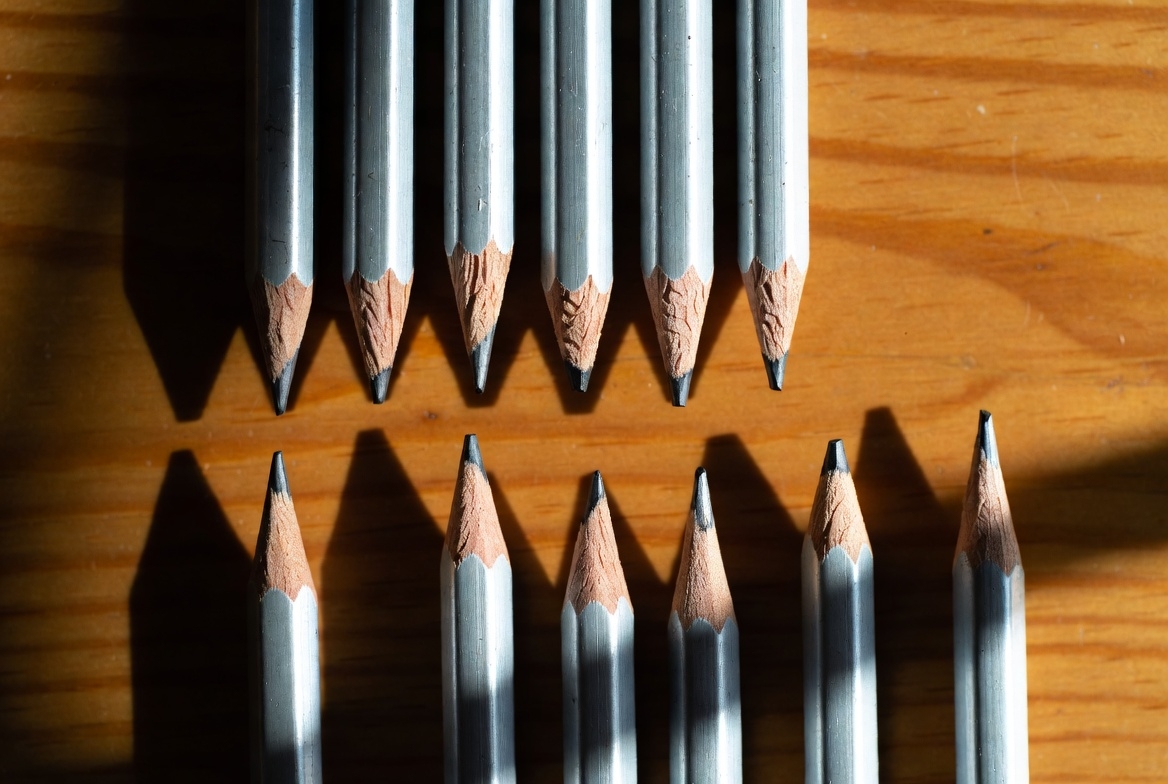The pencil is every artist’s starting point. Whether you’re sketching a quick study, building tonal depth, or laying groundwork for paint, the right pencil delivers control, richness, and longevity. The wrong one snaps, smudges, or fades fast.
This 2025 guide compares every major pencil type, explains hardness scales, paper pairing, and lightfastness—plus decision checklists to help you pick with confidence.
Quick-Reference Pencil Comparison Chart
| Pencil Type | Best For | Tone Range | Smudge Resistance | Erasability | Price Range* | Availability |
|---|---|---|---|---|---|---|
| Graphite | General drawing, shading | H–9B | Medium | High | $1–$5 | Universal |
| Charcoal | Expressive, dramatic sketches | Soft–Hard | Low | Medium | $1–$3 | Art stores |
| Coloured | Illustration, botanicals | 12–150+ | High (wax/oil) | Medium | $2–$6 | Widely |
| Watercolour | Wash effects, mixed media | 12–120 | High | Low | $2–$5 | Specialty |
| Mechanical | Technical, fine lines | 0.3–0.9 mm | High | High | $2–$8 | Stationers |
| Carbon/Charcoal Pencil | Deep blacks, less mess | Soft–Hard | Medium | Medium | $1–$4 | Art suppliers |
*Price per single pencil or small set (2025 global averages)
1. Graphite Pencils – The Everyday Essential
Why Artists Rely on Them
- Universal grading (H–B) → Light H for layouts, velvety 9B for shadows
- No solvents → Safe for all ages and spaces
- UV-stable → Won’t yellow over time
Best Use Cases
- Urban sketches
- Tonal wildlife studies
- Underdrawings before paint
Pro Tip
Harder pencils (2H–H) for crisp lines; softer (2B–6B) for rich shading. Blend with a tortillon for smooth gradients.
2. Charcoal Pencils – Drama in a Stick
Why They Stand Out
- Deep, inky blacks → Ideal for texture and mood
- Blendable → Smudge with a stump for soft effects
- Less mess than vine charcoal → Cleaner for travel
Best Use Cases
- Life drawing
- Expressive landscapes
- Pair with fixative for permanence
3. Coloured Pencils – Vibrant & Portable
The Illustration Powerhouse
- Wax or oil-based cores → Layer like paint
- Lightfast options → Prevent fading (check ASTM ratings)
- Portable → Perfect for fieldwork
Paper Pairing
| Paper Type | Best Pencil Type |
|---|---|
| Smooth Bristol | Wax-based (sharp details) |
| Textured (140 lb) | Oil-based (better grip) |
4. Watercolour Pencils – Magic With a Brush
Why They’re Trending
- Dry or wet → Sketch first, then wash
- No spills → Travel-friendly
- Eco-friendly → Reusable tins
Pro Tip
Use on 300 gsm cold-press paper for best wash control. Add UV spray for outdoor protection.
5. Mechanical Pencils – Precision Engineering
For the Detail-Obsessed
- Consistent line width → 0.5 mm for comics, 0.7 mm for notes
- Refillable leads → Cost-effective
- No sharpening → Clean and reliable
Best Use Cases
- Manga & comics
- Botanical illustrations
- Tattoo design transfers
Decision Checklist: Which Pencil Should You Choose?
- Project Goal? Loose sketches → Graphite (2B–6B) Final artwork → Coloured or Charcoal
- Portability? On-the-go → Watercolour pencils or Mechanical Studio → Full graphite/charcoal set
- Finish Style? Clean & crisp → Mechanical or Hard graphite Rich & textured → Soft graphite or Charcoal
- Budget? Under $5 → Graphite 12-set $10–$25 → 24-piece coloured pencil tin
Hardness Scale Decoded (Don’t Buy Blind)
| Grade | Feel & Use | Durability |
|---|---|---|
| 9H–4H | Hard, light — technical lines | Excellent |
| 2H–HB | Medium — writing, layouts | Excellent |
| B–4B | Soft — shading, portraits | Very Good |
| 5B–9B | Very soft — deep shadows, drama | Good (fixative recommended) |
Pro move: Keep 2H (layout), 2B (mid-tones), 6B (darks)—covers 90% of drawing needs.
Lightfastness for Long-Lasting Art
| Rating | Meaning | Safe for Sale? |
|---|---|---|
| ASTM I | 100+ years | Yes |
| ASTM II | 50–100 years | Yes (indoor) |
| ASTM III | 15–50 years | Avoid direct sun |
Check the packaging. Lightfast coloured pencils are now standard in quality sets.
Final Recommendation
Start here: Grab a versatile graphite set (H–6B) + a 12-piece watercolour pencil tin. Test on mixed-media paper to feel the differences. For eco-conscious artists, look for FSC-certified wood pencils.

